Where The Heart Is. Billie Letts. 1995. 376 pages. [Source: Bought]
The novel opens circa 1985. Novalee Nation, the heroine, is seven months pregnant. She is with her boyfriend, and they're both heading west. He's a man without integrity, to say the least. He does reluctantly give her a ten dollar bill so she can go buy some shoes when her own shoes are lost through the hole in the floor of his car. But he expects a good bit of change back. Or does he? Was he planning to abandon her at the Walmart all along? Or did he just get tired of waiting? Does it matter? The truth is that Novalee Nation is left at a Walmart in a small town in Oklahoma with only $7.77. She has no family to call, no friends either. So Novalee settles down in Walmart for the rest of her pregnancy, hiding when need be, so no one knows that she is living there. She ventures out during the day and meets people, meets the librarian, for example. By the end of her pregnancy, she's made a few friends. Now these new friends of hers don't know the truth exactly. But they're not the type of people who would care overly much about the truth. Novalee happens to find herself among the least judgmental folks she's ever met. The book spans seven years worth of drama. If the book has a theme it is one of 'home' and 'belonging' and 'family.'
Where the Heart Is was not a good match for me. I wanted a different book, perhaps. A book that kept the "down-to-earth" quirky characters perhaps, but, lost much of the smut. It isn't that Where the Heart Is is your traditional smutty romance--it isn't, far from it. But I thought there were certainly plenty of details that were tasteless. Why did readers need to follow Willy Jack's story at all???? Every chapter that focused on Willy Jack seemed tasteless and pointless. Why do we need to know about his time in prison? If the story had centered exclusively on Novalee Nation, would I have liked it a bit more? I think I would have. At least I wouldn't have hated it. Eliminating Willy Jack wouldn't have solved all the problems, one scene that was too much to take, and rightly so, was the child rape. The scene had every right to be disturbing. It was a horrible awful situation. Still. The details were too much. The profanity--the blasphemy--was also too much. © 2014 Becky Laney of
Becky's Book Reviews
The Princess of Celle. Jean Plaidy. 1967/1985. Ballantine. 400 pages. [Source: Bought]
The Princess of Celle felt longer than it actually was. Perhaps because the chapters were so long. Perhaps because the book was complicated. If it helps, it was necessarily complicated. It is the story of a dysfunctional German family, one of whom would come to the throne of England as George I.
I was a bit disappointed that George Lewis does not become George I until the epilogue of this one! I suppose I had the silly idea that this book would focus on the obviously unhappy marriage between George Lewis (George I) and Sophia Dorothea (the so-called Princess of Celle). And, in a way, it is. But George Lewis is one of the most unimportant characters in the whole book. Seriously. Readers get to know--for better or worse--his mother, his father, his uncle, his aunt, some of his brothers. But for George himself? Well, he gets a tiny fraction of the author's attention.
If I had to describe The Princess of Celle, I would say it was a tug of war between multiple generations of mistresses in a super dysfunctional German family. I would say that almost all the men in the novel are vile, power-hungry, lusty creatures with big egos. I would say that the mistresses in the novel are vile, power-hungry, lusty creatures with big egos. The wives, well, have to make the best of it. They may hate their husbands. They may hate the mistresses their husbands keep. They may be humiliated in public by those mistresses. But they can take comfort that their children are legitimate.
For better or worse, the "main" story of The Princess of Celle begins in the middle of the novel. It is at the halfway point that readers see Sophia Dorothea marry her cousin George Lewis. She had wanted to marry someone else, another cousin. He had not cared who he married. He was content to marry whomever pleased his mother...and his father. He very much cared about picking his own mistresses. But a wife?! Not worth his bother. It's not like he'll be enjoying her company!
Is Sophia Dorothea the main character? I'm not sure that she is if I'm honest. She's not the strongest character. The most obnoxious or ambitious or strong-willed. George Lewis's mother is SOMETHING. As is his father's mistress, Clara von Platen. I would say that Clara gets more time and attention from the novel than any other character in this one. What does Clara want? What will Clara do to get what she wants? Who will Clara hurt to get her way? How many lives can she destroy? How much power can she grab? How can she keep the power? Clara is a disgusting character, truly revolting.
Did I like Sophia Dorothea? Well. She may not be as horrid as Clara. Who could be?! But she could not keep my sympathy. Yes, to a certain point I could see why she was so miserable and so trapped. She could not escape her in-laws and her husband. Not that her husband stayed remotely close to her. He was off doing whatever, whenever, whoever. But court-life was miserable for her because of the dominant women: her mother-in-law and her father-in-law's mistress. There were people at court, namely Clara that hated her and were actively plotting against her, plotting to ruin her life thoroughly. It was almost Clara's one ambition in life to destroy Sophia Dorothea, or perhaps the right word is obsession.
A sick love triangle. What every book needs is a love triangle, right?! Sophia Dorothea falls for the same man as Clara. His name was
Königsmarck. There was nothing about him that I could admire or respect. Because his love for Sophia Dorothea was oh-so-pure and oh-so-true, he satisfied his lusts with Clara. Until he went off to war and was thought to be missing in action. Then Sophia Dorothea rejoiced with his return! Of course, she abandoned her morals, she was so happy! Clara then takes evil to a whole new level. You see, Clara already hated her and despised her. She already was out to get her. But NOW...she was a million times more determined to win the day.
I did not like spending time with any of these characters. I really didn't. © 2014 Becky Laney of
Becky's Book Reviews
The Rock & Roll Queen of Bedlam. A Wise-Cracking Tale of Secrets, Peril, and Murder! Marilee Brothers. 2009. Medallion Press. 300 pages.
Panty hose are a tool of the devil. On a tall woman, the crotch hangs at knee level, so she's forced to crouch and shuffle like Quasimodo. If a woman is vertically challenged, the things slither downward, pooling around her ankles like a reptilian second skin. My trouble began with panty hose.I didn't love it. I didn't hate it. I found it an easy read, a light read. I liked *some* of the humor, especially the first paragraph. But. It wasn't all to my liking--my taste. I will mention, however, that the jacket description is flawed at best. It emphasizes all the
wrong aspects of the novel.
This novel stars a teacher, Allegra Thome, who enjoys singing karaoke. It is because of her stumble into trouble that she loses her boyfriend, Michael, and meets her new love interest, Sloane. That relationship intensifies when one of Allegra's students goes missing. Sara Stepaneck is close friends with her nephew, Nick, in addition to being one of her own students. Most everyone is convinced it's just another runaway, but there are just enough clues to indicate otherwise. Trouble is that people close to Sara are turning up dead--her dad, her social worker. Will Allegra be next? Will her private investigation into this young girl's disappearance prove deadly?
© 2011 Becky Laney of
Becky's Book Reviews
Ten Things I Love About You. Julia Quinn. 2010. HarperCollins. 384 pages.
"The key to a successful marriage," Lord Vickers pontificated, "is to stay out of the way of one's wife." Such a statement would normally have little bearing on the life and fortunes of Miss Annabel Winslow, but there were ten things that made Lord Vickers's pronouncement hit painfully close to the heart. One: Lord Vickers was her maternal grandfather, which pertained to Two: the wife in question was her grandmother, who Three: had recently decided to pluck Annabel from her quiet, happy life in Gloucestershire and, in her words, "clean her up and get her married." Of equal importance was Four: Lord Vickers was speaking to Lord Newbury, who, Five: had once been married himself, apparently successfully, but Six: his wife had died and now he was a widower, and Seven: his son had died the year prior, without a son of his own. Which meant that Seven: Lord Newbury was looking for a new wife and Eight: he rather thought an alliance with Vickers was just the thing, and Nine: he had his eye on Annabel because Ten: she had big hips. Oh, blast. Had that been two sevens?
Annabel sighed, since that was the closest she was permitted to slumping in her seat. It didn't really signify that there were eleven items instead of ten. Her hips were her hips, and Lord Newbury was presently determining if his next heir ought to spend nine months cradled between them.
Ten Things I Love About You is the sequel to
What Happens In London. It stars Sebastian Grey, the handsome cousin of Sir Harry Valentine. He is spending a lot of time (especially meal times) with Harry and Olivia. What he does outside of their company may shock society--at first--and it's
not seducing married women. Every one knows he does that. (Hint: his real secret is revealed in the prologue. So it isn't a secret for long. And it's a rather delightful secret, in my opinion. But I hesitate to mention it because even though it is revealed early on in this book. It might effect how others read
What Happens in London.)
The heroine, Miss Annabel Winslow, meets our hero when she is running away from Lord Newbury. The good news? Newbury's lusty advances were thwarted in time. It doesn't make Annabel feel any cleaner. She's still disgusted by the thought of his hands on her body--anywhere on her body. But at least she escaped...this time. She doesn't know Sebastian's name. He doesn't know hers. But for whatever reason, they're able to talk to one another freely. In seclusion. Both know it's improper--she's obviously an innocent. Not his usual "type" at all. But there's just something drawing them together...
When she does learn his name, well, that's when she learns how dangerous it could be. For Lord Newbury is Sebastian's uncle; he's next in line to inherit if Newbury doesn't have another son. She KNOWS that these two are enemies. And she knows that many, many people would disapprove of even the smallest acquaintanceship between the two. He has a horrible reputation. No one has to tell her that much. (She did come across him politely "waiting" to return to the party after a secret meeting with a woman). So why can't she forget him?
I enjoyed Ten Things I Love About You. I loved Sebastian (though I can't tell you why) and I really liked Annabel. I also liked Olivia and Lady Louisa. While it is different (in quite a few ways) from
What Happens In London, I thought it worked. It reminded me more of
The Duke
A Darcy Christmas: A Holiday Tribute to Jane Austen. By Amanda Grange, Carolyn Eberhart, and Sharon Lathan. Sourcebooks. 304 pages.
From
Mr. Darcy's Christmas Carol by Carolyn Eberhart:
Old Mr. Darcy was dead to begin with. There is no doubt whatsoever about that. The clergyman, the clerk, the undertaker, and the chief mourner had all signed the register of his burial. His son signed it. And Fitzwilliam Darcy's name was as good as his father's before him. Old Mr. Darcy was as dead as a doornail. From
Christmas Present by Amanda Grange:
It is a truth universally acknowledged, that a married man in possession of a good fortune, must be in want of an heir, and Mr. Darcy of Pemberley was just such a man. Moreover, he was soon to have that want satisfied, for his wife, Elizabeth, was expecting their first child. From
A Darcy Christmas by Sharon Lathan:
He set the painting onto the sofa, assuring it was well supported before stepping away. He gazed at the canvas, a smile spreading as he looked upon his family. His family. The family created by him and his wife, just as he had dreamt for so many lonely years. They stood on the portico of Pemberley flanked by their precious children on the steps. All of them were smiling at the artist. A sentimental man by nature, he silently examined the newest portrait of his family and lost himself in happy memories. For the most part, I liked this one. I did. I really enjoyed two of these novellas! And while I wasn't impressed with "A Darcy Christmas" I would still recommend this collection.
"Mr. Darcy's Christmas Carol" was surprisingly fun. I had my doubts--as you might have your doubts about weaving these two stories together--but I thought it worked. It does a slight variation on the original. What if Jane and Charles Bingley got their happily ever after--after Lydia was "rescued" by Mr. Darcy's intervention--but Mr. Darcy's pride was still in the way of his declaring his love (the second time). This is what that first Christmas might have been like. If he'd been visited by the spirits of Christmas past, present, future.
"Christmas Present" was a great novella by Amanda Grange. I've enjoyed many of her Austen adaptations in the past. This one did not disappoint. She got the characters just right. It felt authentic like what a Darcy Christmas might have *really* been like. Elizabeth and Darcy are expecting their first child, and Charles and Jane just had their first child. So the families are coming together--the extended families--to celebrate. I really enjoyed this one!
"A Darcy Christmas" is a collection of holiday short stories following the Darcy family through twenty or so years of marriage. (I believe we see their twenty-third Christmas as a couple? Although I might have lost track of the last few stories.) Since we only catch glimpses of the family--on Christmas Eve/Christmas--it's hard to precisely follow these stories. We do know that (almost) every Christmas sees Elizabeth either with a new baby or pregnant. (Perhaps these stories do connect to Lathan's previous novels about Elizabeth and Darcy. If that is the case, then the stories might make more sense when it comes to keeping up with their family, friends, etc. Especially in the case of her children's love interests.)
© Becky Laney of
Becky's Book Reviews
Bespelling Jane Austen. By Mary Balogh, Susan Krinard, Colleen Gleason, Janet Mullany. 2010. Harlequin. 377 pages.
From
Almost Persuaded by Mary Balogh:
Miss Jane Everett, middle daughter of Sir Horace Everett of Goodrich Hall in Hampshire, did not call as often as she ought at the vicarage in the village nearby. She called everywhere else--on tenants and laborers and others, on those who sick or elderly or in need of any sort. She took her duties very seriously. From
Northanger Castle by Colleen Gleason:
Miss Caroline Merrill smoothed her ruffled-hem skirt as she settled into the chair against the wall. She quickly tucked her feet under the seat to keep them from being stepped upon or tripped over, and confirmed that the heavy, bulky reticule still dangled from her wrist. One never knew when one might need one of the accoutrements from within.From
Blood and Prejudice by Susan Krinard:
It is a truth universally acknowledged that every decent straight guy who isn't dead broke, is in want of a good woman. As my dear Grandpa Bennet used to say...Bull.From
Little To Hex Her by Janet Mullany:
"She turned me into a frog." I bit back the comment that he seemed to have recovered. "I can't tell you how sorry I am, Elton. I know it's no excuse, but it is almost full moon, and Harriet tends to be..." I paused and added a description of my assistant that seemed lame as soon as it was out of my mouth. "Difficult."Bespelled By Austen is a collection of paranormal novellas "inspired by" four Jane Austen novels. Northanger Castle and Almost Persuaded are historical retellings of Persuasion and Northanger Abbey. (Names and situations have been altered.) Blood and Prejudice and Little To Hex her are modern day adaptations of Pride and Prejudice and Emma. Names have not changed though many aspects of the novel have been updated to reflect a contemporary setting. Each novella is by a different romance novelist. As you can imagine with reading any collection of novellas I have favorites and not so favorites. (My favorites may not be your favorites.)
My thoughts on "Almost Persuaded": I was not almost persuaded to believe in reincarnation. Unfortunately, that seemed to take precedence over the romantic aspects of this retelling of Persuasion. Much of the dialogue between our hero, Captain Mitford, and heroine, Jane Everett, seeming to be about past lives, soul mates, and such. You might not think it would be so intrusive to the text, but I found it to be so. When they weren't talking about the many times they got their love wrong in their past lives, they were doing things that seemed out of place with the historical time period. (Like shedding some clothes to go swimming together, and then getting intimate.) I did NOT like this one at all. Persuasion is my favorite Austen, and to see it "adapted" in this way irritated me.
My thoughts on "Northanger Castle": To be honest, I don't have many thoughts on this one. Unfortunately, I had a headache while reading this one, and I didn't feel a connection with this one. But. I think it was probably my fault. I think I would have been struggling to "enjoy" whatever I was reading at that time.
My thoughts on "Blood and Prejudice": This one was interesting. I thought I wouldn't like the modern-day adaptations. But I found both Blood and Prejudice and Little To Hex Her the best in the collection. Elizabeth, our heroine, finds out a secret about Mr. Darcy--and Mr. Wickham--they're vampires! But she's still doesn't have all her facts straight. Can Elizabeth discover the truth in time to find love for herself and her older sister, Jane? I liked this o
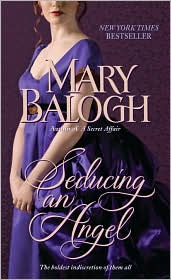
Seducing an Angel by Mary Balogh. 2009. Random House. 416 pages.
"What I am going to do is find a man."
Seducing an Angel is the fourth in Mary Balogh's Huxtable Family series. The first three are First Comes Marriage, Then Comes Seduction, and At Last Comes Love. This fourth book focuses on the brother in the family, Stephen. He is the "angel" of the title, the man our heroine, Cassandra Belmont (Lady Paget), has determined to seduce.
It would be nearly impossible for a widow to have a worse reputation than Lady Paget. She's rumored--by the ton--to have killed her husband. With an axe. The fact of the matter, for those that care about facts, is that her husband died from a bullet to the heart. When Seducing An Angel opens, Lady Paget is newly returned to London. She's got little to lose--no money, no jewels, no estate, no reputation. So she decides that perhaps it's time to try a new vocation. She's out to catch a man to keep her. She is seeking a man willing to pay well for her services. Once she hears that Stephen Huxtable is oh-so-wealthy and oh-so-single, well, she's determined that he may just be the perfect man for her.
Stephen is a little shocked by just how bold Cassandra is. How blatantly she is pursuing him at the ball. Widow or not, she's behaving very shockingly. She wants him in her bed before the night is out.
But what she doesn't realize is that Stephen may be uncomfortable with how she wants this business arrangement to go...he wants her mind and body or not at all.
I liked this one. It's not my favorite of the four I've read. Cassandra isn't the easiest heroine to love. Both Seducing an Angel and At Last Comes Love deal with abusive husbands and the predicament of married women--the fact that men legally had complete power, complete control over their wives. They were their possessions to use and abuse as they saw fit.
© Becky Laney of Becky's Book Reviews
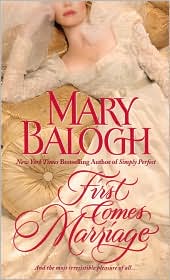
First Comes Marriage. Mary Balogh. 2009. Random House. 416 pages
Everyone within five miles of the village of Throckbridge in Shropshire had been in a spirit of heightened sensibilities for the week or so preceding February 14.
I love Regency romances. I do. I love Georgette Heyer. I love Julia Quinn. While I don't love Mary Balogh quite as well as either Heyer or Quinn, I am very happy to have discovered her. First Comes Marriage is the first in a quartet starring the Huxtable family. There are three daughters: Margaret, Vanessa, Katherine. And one son: Stephen.
First Comes Marriage focuses on Vanessa. What is this one about? Well, Stephen unexpectedly inherits a title and estate. The guardian, Elliott Wallace (aka Viscount Lyngate), arrives to tell him the news. He wants Stephen to go to Warren Hall. He feels Stephen needs training and guidance to learn how to manage everything. Stephen agrees. But he insists on bringing his three sisters. Elliott isn't thrilled. He thinks these sisters will mean more trouble for him. They'll need training too. But somewhere along the way...Elliott decides that marrying one sister may solve his problems. She'll be able to sponsor her sisters and introduce them to London society.
Elliott didn't plan on asking Vanessa to be his wife. But. When she asks him to marry her. Well, he can't think of a good reason not to say yes. Will this marriage of convenience turn into a love match?
I enjoyed this one. I thought it was well written. I thought the characters were well developed.
© Becky Laney of Becky's Book Reviews
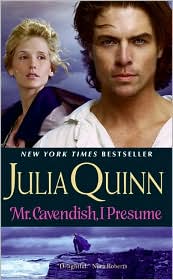
Mr. Cavendish, I Presume. Julia Quinn. 2008. HarperCollins. 384 pages.
It was a crime that Amelia Willoughby was not married. At least that was what her mother said.
Mr. Cavendish, I Presume is a companion novel to The Lost Duke of Wyndham. I can't remember reading two books tied so closely together--within the romance genre. (The only example I can think of is Ender's Game/Ender's Shadow.) While The Lost Duke of Wyndham tells the story of Jack Audley and Grace Eversleigh, Mr. Cavendish, I Presume tells the story of Thomas Cavendish and Amelia Willoughby.
Thomas and Amelia have been betrothed for twenty years. Amelia was just an infant when her father contracted the marriage with the future Duke of Wyndham.
As far back as her earliest memory, it had been impressed upon her that this man (boy that he was at the time) was in charge. Her life, quite simply, and with no arguments accepted, revolved around his.
He spoke, she listened.
He beckoned, she jumped.
He entered a room, and she smiled with delight.
And most importantly, she was glad for the opportunity. She was a lucky girl, because she got to agree with everything he said.
Except--and this had to be his greatest offense--he rarely spoke to her. He almost never beckoned--what could he possibly require that she could provide? And she'd given up smiling when he entered a room because he was never looking in her direction, anyway. (32)
Thomas is indifferent to Amelia, and that infuriates Amelia. It's not that she's in love with him. She's not. How can she love a man who's practically a stranger to her? What frustrates her is that she wants to get to know him. And he obviously doesn't want to get to know her. Now that she is of age, why isn't he taking the proper steps to making her his wife? How long will she have to wait for him?
What changes? It starts when he finds her alone in the garden and they share a kiss.
"I ought to kiss you again," he said, lifting one brow into a practiced, arrogant arch.
She wasn't so sophisticated that she had a ready retort for that, a circumstance with which he found himself quite satisfied. He leaned forward slightly, smirking.
"You're quiet when I kiss you."
She gasped with outrage.
"You're quiet when I insult you as well," he mused, "but oddly, I don't find it quite as entertaining."
"You are insufferable," she hissed.
"And yet they arrive," he sighed. "Words. From your lips."
"I'm leaving," she declared. She turned to stalk back into the assembly hall, but he was too quick, and he slid his arm through hers before she could escape. (38)
It escalates when his world becomes threatened by the arrival of Jack Audley, a young man who could very well be the rightful Duke of Wyndham. Who is Thomas if he isn't the Duke? Amelia has been raised to be the Duchess. Does he even have a claim to her if he loses his title and land? Would she want him if he wasn't the Duke? Is it fair that he would want her still? Will these two have their happily ever after?
Mr. Cavendish, I Presume shares so much with
The Lost Duke of Wyndham. Same characters, same scenes, same dialogue. But the book is narrated by different characters. So readers learn what went on behind
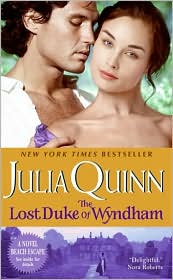
The Lost Duke of Wyndham. Julia Quinn. 2008. HarperCollins. 384 pages.
It's very silly, but it works: "You don't know Jack. But you could. Read this book. Fall in love. With Jack Audley, Julia Quinn's most dashing romantic hero yet."
First paragraph: Grace Eversleigh had been the companion to the dowager Duchess of Wyndham for five years, and in that time she had learned several things about her employer, the most pertinent of which was this: Under her grace's stern, exacting, and haughty exterior did not beat a heart of gold. Which was not to say that the offending organ was black. Her grace the dowager Duchess of Wyndham could never be called completely evil. Nor was she cruel, spiteful, or even entirely mean-spirited.
Our heroine, Grace, works as a companion. She's not of the same social class as her employer. She's good enough to be at the beck and call of the dowager. But not good enough--wealthy enough--to merit marriage proposals from the eligible men in the neighborhood. And she's especially, especially not good enough to entertain thoughts of a grand marriage. Class has always mattered to the dowager--a prouder woman Grace has never met--but it's never been an issue with Grace. Not really. But all that changes when Jack comes on the scene.
Who's Jack? He is a highwayman. He meets the dowager and her companion late one night. He holds them at gunpoint. What Jack didn't expect was to be recognized. The dowager becomes convinced--then and there--that this man, has to be the son of her favorite son, John, a son she's never stopped mourning. She begs him to visit her--without a mask--the next day. She needs to see him. She won't rest until he's been restored to the family. Even if that means seeing the current duke, Thomas, lose his place in the family.
The encounter upsets Grace as well. Jack takes her breath away with one little kiss.
"She was being seduced. She could barely breathe--but this, she knew. In a few minutes they would part ways, and he would have done nothing more than kiss her, and she would be forever changed" (12).
And
"Grace touched her mouth, trying to pretend she did not love the shivers of excitement that rushed through her at the memory. He had kissed her. It had been her first kiss, and she did not know who he was. She knew his scent, she knew the warmth of his skin, and the velvet softness of his lips, but she did not know his name. Not all of it at least" (18).
Within a day or two of their first encounter, he's moved into the mansion. And Grace is encountering him again and again and again. He's just as drawn to her as she is to him. Jack is charming. He's more than just handsome. He's witty too. He loves to tease.
"You stole a kiss."
"That," he said, leaning forward with great cheek, "was freely given."
"Mr. Audley..."
"I do wish you'd call me Jack," he sighed.
"Mr. Audley," she said again. "I did not--" She looked quickly about, then lowered her voice to an urgent whisper. "I did not...do...what you said I did."
He smiled lazily. "When did 'kiss' become such a dangerous word?"
She clamped her lips together because truly there was no way she would gain the upper hand in this conversation.
"Very well," he said. "I shan't torment you."
It would have been a kind and generous statement if he hadn't followed it with: "Today."
But even then, she smiled. It was difficult not to, in his presence. (121)
But now that this highwayman is quite likely the rightful heir, the Duke, their love is more forbidden than ever. And the dowager is not f

No Will But His. A Novel of Kathryn Howard. Sarah A. Hoyt. 2010. April 2010. Penguin. 352 pages.
Kathryn Howard was the young and unfortunate fifth wife of Henry VIII. I was familiar enough with her story--my favorite account being a novel by Alisa Libby--The King's Rose. But reading about the Tudors--Henry's wives, his children, etc.--is one of my guilty pleasures. So when I saw this one at the library, I knew I had to read it.
Did this young teenager love the King? respect the King? Was she urged into this marriage by her family? Or did she have some ambition of her own? Did she want to be Queen so much that she was willing to risk everything? Was she in love with another man when she married the King? Or did love come later? come too late?
Kathryn was not perfect, was not innocent, was not perfectly innocent. But at one time the King thought she was. And when he learned about the Queen's past, well, it turned ugly. I did like the way this story unfolds for the reader.
© Becky Laney of Becky's Book Reviews
 Lawrence, D.H. 1928. Lady Chatterley's Lover.
Lawrence, D.H. 1928. Lady Chatterley's Lover.
Ours is essentially a tragic age, so we refuse to take it tragically. The cataclysm has happened, we are among the ruins, we start to build up new little habitats, to have new little hopes. It is rather hard work: there is now no smooth road into the future: but we go round, or scramble over the obstacles. We've got to live, no matter how many skies have fallen.
According to what I've read on the internet, though it was written in 1928, this was one was deemed 'too smutty' to be published (at least widely published) until the 1960s. And even then, it took some trials to do it. Is it obscene? Is it literature? Is it both? Can a book legitimately be both? No doubt, it was shocking then. But is it still 'shocking' now?
I didn't know quite what to expect from this one. It doesn't start off horribly shocking. It starts off rather beautifully. Smooth and beautiful. Poetic. It feels like truth. Even if you disagree with the philosophy in general, it still feels true. Words have a way of doing that. That's why words are often considered dangerous. The reader is introduced to Constance "Connie" Chatterley, the wife of a paralyzed war veteran, Clifford Chatterley. The two are married. The two are seemingly wealthy. Better off than most in any event. He is a nobleman, a "lord" and by marriage that makes Connie a "lady." But she doesn't feel comfortable with that title and the responsibilities of being 'above' everyone else. Her wealth and position are a burden, little else, to her.
In a way, Lady Chatterley's Lover asks the question, can "modern" men and women be happy? What does it mean to be happy? What does it mean to be successful? What does it mean to really live? Is life really truly about the earning and spending of money? Is the quality of life really and truly measured by how much stuff you have? Is money itself evil? Is industry and technology evil?
In regards to happiness, the novel addresses the issue of love and sex and successful careers in terms of 'making' people 'happy.' Clifford, since the accident, throws himself into trying to be "successful." At first this success is all about fame and acclaim. He wants to write. He wants to be heard. He wants to be known. He wants people to see him as a success. When this proves unsatisfying, he turns to industry. He turns to being a business man. For Clifford, this means getting involved in the coaling industry. The pits and mines and dealing with the working class. Connie, on the other hand, throws herself into several things. At first thinking that if she can find love on an intellectual level she'll be happy...then thinking if she can find satisfaction on the physical level...then thinking if she could only have a child to love and nurture...and so forth. Connie is always changing the definitions of what it takes for her to be happy and satisfied with her life. Early in the book, she thinks that if she can intellectually love her husband but find some relief with another man (she does have needs after all) then all will be well. But as Clifford changes as well, she realizes she doesn't want anything at all from him. The less she has to do with her husband, the less her life is connected with his the better.
Oliver Mellors, the lover of Lady Chatterley and the game-keeper of Lord Chatterley, is an interesting character. (Probably the most interesting character in the entire novel.) His dialect makes him a bit hard to understand, for one thing, and his personality is more abrasive than the others in a way. He's more tell-it-like-it-is than the rest. In a way, he's tender, but in other ways he's very rough around the edges. Very gruff. And he's definitely got a grudge against the world, though in all honesty all the characters seem to have a grudge against the world. Mellors is definitely cynical about love and marriage and committing to one woman. And he's not really a family man either. It's not that he's a heart-breaker necessarily. He's not a player in that way. It's more he's a guy who's up front that he wants sex, needs sex, loves sex. And he's not going to put up with a woman who doesn't share that. That is one reason why his marriage didn't work out right.
The novel isn't just about this adulterous affair. A novel that stretches the limits in what you can talk about in that regards. Far from it. It's about social class, economics, philosophy, gender differences, society, you know, meaning of life type stuff. Here are two quotes about money which I think just scream relevance:
"Anyhow, nobody knows what should be done in spite of all the talk, the young ones get mad because they've no money to spend. Their whole life depends on spending money, and now they've got none to spend. That's our civilization and our education: bring up the masses to depend entirely on spending money, and then the money gives out." (268)
"If you could only tell them that living and spending isn't the same thing! But it's no good. If only they were educated to LIVE instead of earn and spend, they could manage very happily on twenty-five shillings." (268)
The novel has its sections where it lays out an argument against this 'modern' life. This philosophy of spend, spend, spend. A philosophy of I want it, I deserve it, I need it...NOW! So it was refreshing to see the novel in that light. It was also weird, in a way, to see the juxtaposition of reason and intellect versus animal instinct (if it feels good do it--and keep doing it) battle it out to see which way makes a person happiest.
Have you read this one? What did you think? Do you think it too pornographic to be literature? Do you think it is just as shocking today as when it was first written? What did you think about that ending?
© Becky Laney of
Becky's Book Reviews Subscribe to receive updates in your favorite reader
Subscribe to receive updates in your favorite reader.





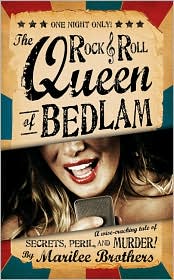
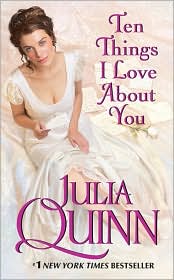
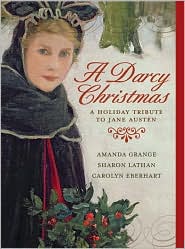
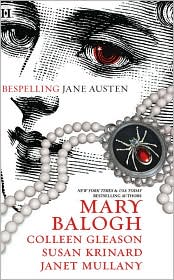






 Subscribe to receive updates in your favorite reader
Subscribe to receive updates in your favorite reader
This sounds good. Too bad it didn't really work for you!
I hate when the book jacket gives you the totally wrong description of the novel. This sounds like a nice book, but it's not really my... genre.